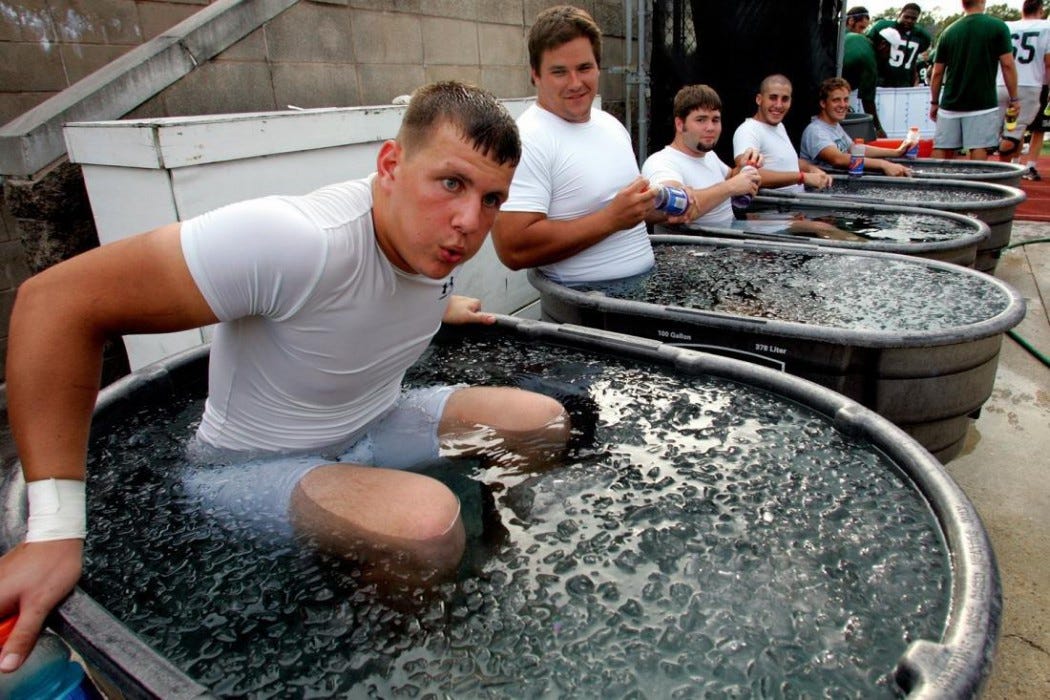In this world of fitness, wellness, and recovery, myths often circulate as fervently as the latest workout trends. That is an issue, but not one to lose sleep over. The biggest issue, though, is when such misinformation cascades through the populace and they feast on it. It spreads like wildfire, and before you know it, it’s the new gospel truth. When that happens, the people lose. Everyone here hates that. That’s why we commissioned an elite Deep Dive Wellness taskforce to go down this rabbit hole with just one mission: to discern and debunk [with scientific facts] all myths that surround ice baths.
Why should you care?
While the purported benefits of cold exposure are often touted, it's essential to separate fact from fiction so you can leverage the practice to your benefit. Ice baths, in particular, have not escaped the scrutiny of skeptics. That means you’ll come across many backpedaling myths as facts. Not on our watch!
In this article, our taskforce probes into some common myths surrounding ice baths, backed by relevant statistics and insights from various perspectives.
Welcome to the oval office, here’s the debrief…
Myth 1: Ice Baths Hinder Muscle Adaptation to Exercise
I’m sorry, what?! Contrary to the belief that ice baths impede muscle adaptation, evidence suggests that they may not hinder long-term gains. And you’ll be glad to know that this is not hearsay from a hipster behind a laptop down in Idaho. No.
A study in the Journal of Physiology [1] found that while cold water immersion blunts some molecular signaling pathways related to muscle growth, it doesn't necessarily compromise overall muscle adaptation. It's essential to view this in the context of individual fitness goals and the type of exercise regimen. A good place to start is here.

Myth 2: Ice Baths Increase the Risk of Injuries
Yeah, that’s probably why peak athletes like Michael Phelps, Cristiano Ronaldo, Usain Bolt, et al. embrace them—to increase their risk of injury. Pfff! To say that the fear that ice baths might, even in the slightest, increase the risk of injuries is not well-founded is an understatement.
A systematic review published in the British Journal of Sports Medicine [2] indicates that there is no substantial evidence whatsoever linking cold water immersion to an elevated risk of injuries. In fact, when used appropriately, ice baths can be a valuable tool for managing exercise-induced inflammation. Something you would expect elite sportsmen with squadrons of health advisors to know, right? And now, you do too.

Myth 3: Ice Baths Are Ineffective for Endurance Athletes
This fable has been challenged by scientific evidence more times than you want to care. Endurance athletes, characterized by prolonged and intense aerobic activities, have often questioned the applicability of ice baths to their recovery routine. However, a closer examination reveals that cold water immersion can indeed play a valuable role in supporting the recovery needs of endurance athletes.
A study published in the Journal of Science and Medicine in Sport [3] explored the impact of cold water immersion on the recovery of endurance athletes. Contrary to the myth, the research indicated that the practice could be beneficial in mitigating muscle soreness and enhancing overall performance in subsequent sessions.
Endurance activities often result in sustained muscle engagement and fatigue, leading to muscle damage and inflammation. The study found that ice baths, when incorporated into the recovery protocol, contributed to a reduction in muscle soreness. This is particularly relevant for endurance athletes who engage in repetitive, high-impact activities that can lead to cumulative muscle damage over time.
Moreover, the research suggested that cold water plunging could positively influence subsequent exercise performance. It wasn’t by impulse, for example, that Tottenham fullback Emerson Royal spent $1.25 million [4] to transform an entire room in his home into an ice bath.

Endurance athletes often face the challenge of managing fatigue and optimizing recovery between training sessions. Ice baths emerged as a potential tool to expedite recovery, allowing athletes to maintain training intensity and quality over time.
It's essential to recognize that the effectiveness of ice baths for endurance athletes may vary based on factors such as individual response, the specific demands of their training regimen, and the timing of cold water immersion in relation to their workouts. While the myth dismisses the relevance of ice baths for endurance training, the evidence points to their potential to support recovery and enhance performance in this specific athletic context.
Myth 4: Ice Baths Are Exclusively for Professional Athletes
Such elitism and gatekeeping should be bundled up, rolled over, and shot up in the sun. The belief that ice baths are reserved for elite athletes is, due to lack of a better term, sheer propaganda. Individuals at various fitness levels can benefit from cold water immersion. Research in the Journal of Athletic Training [4] indicates that recreational athletes, fitness enthusiasts, and hillbillies can experience reduced muscle soreness and improved perceived recovery after engaging in ice baths.

Myth 5: Ice Baths Pose a Danger to Heart Health
Really? Since when? Look, concerns about ice baths adversely affecting cardiovascular health are often rooted in misinformation. If you’ve cared to read our previous blog posts, this should be clear as crystal. If you haven’t, let me call up some scientific backup for you.
A review in the European Journal of Applied Physiology [5] concludes that when used appropriately, ice baths do not pose a significant risk to individuals with a healthy cardiovascular system. However, as common sense would dictate, those with pre-existing conditions should consult with a healthcare professional before incorporating ice baths into their routine.
Myth 6: Ice Baths Impair Immune Function
I have had a flat-earther, and a few conspiracy theorists come at me with this issue. The thing is, concerns about ice baths suppressing the immune system are not substantiated by any current research that we know of.
A study in the European Journal of Applied Physiology [6] suggests that while cold water immersion may temporarily affect certain immune markers, the overall impact on immune function is minimal. It's crucial to acknowledge that individual responses may vary, and you should consider your specific health context.
Myth 7: Ice Baths Are Only Beneficial Immediately After Exercise
The notion that ice baths provide benefits only when administered immediately after exercise is a misconception that oversimplifies the potential advantages of cold water immersion. While the immediate post-exercise period is indeed crucial for recovery, research suggests that the benefits of ice baths extend beyond this narrow timeframe.

A meta-analysis in the Journal of Sports Science & Medicine [7] indicates that the timing of cold water immersion can influence its effectiveness, with benefits observed even when applied hours post-exercise. You should explore optimal timing based on your training schedule and individual preferences. Once you ace that, the rest is cream cheese.
Myth 8: Ice Baths Cause Frostbite or Cold Injuries
You would be forgiven for dancing on the winds of such gossip. I, too, used to. Here’s the truth, though: the fear of developing frostbite or cold-related injuries from ice baths is often exaggerated. A study in the Journal of Athletic Training [8] emphasizes the importance of proper protocols and duration to mitigate the risk of adverse effects. When used responsibly, just like any other thing, ice baths can provide therapeutic benefits without posing a significant threat of frostbite.
You don’t have to age from the ice bath. You weren’t born there in the first place. So, plunge in for some time and move on. The day is long, Charlie. Move on.

Myth 9: Ice Baths Are Uncomfortable but Ineffective
Uncomfortable? Certainly. Ineffective? I beg your pardon?! Those who assume that discomfort during ice baths correlates with ineffectiveness live on a flat earth in an alternate universe. And if any live within us, let me slap them with some scientific facts.
Research in the International Journal of Sports Physiology and Performance [9] suggests that subjective comfort levels do not necessarily reflect the physiological benefits of cold water immersion. You should distinguish between temporary discomfort and the potential long-term gains in recovery.

Myth 10: Ice Baths Are a One-Size-Fits-All Solution
Ice baths, like any recovery strategy, are not universally applicable. A study in the Journal of Science and Medicine in Sport [10] underscores the importance of individualization in recovery practices. Athletes should consider factors such as personal preferences, training intensity, and overall health when determining the suitability of ice baths in their regimen.
In dispelling these additional myths, it becomes evident that the narrative surrounding ice baths is nuanced. While the evidence supports their efficacy in certain contexts, it's crucial to approach this recovery method with a discerning perspective, considering the diversity in individual responses and the varied nature of exercise regimens.
If you're looking to tap into ice bath therapy and live on the right side of life, a good place to start is here.

Sources:
- Roberts, L. A., & Raastad, T. (2019). Markers of skeletal muscle adaptation: No pain, no gain? Journal of Physiology, 597(16), 4123–4133. Link
- Hohenauer, E., Taeymans, J., Baeyens, J. P., Clarys, P., & Clijsen, R. (2015). The effect of post-exercise cryotherapy on recovery characteristics: a systematic review and meta-analysis. British Journal of Sports Medicine, 49(14), 880–887. Link
- Rowsell, G. J., Coutts, A. J., Reaburn, P., & Hill-Haas, S. (2009). Effect of cold water immersion after exercise in the heat on muscle function, body temperatures, and vessel diameter. Journal of Science and Medicine in Sport, 12(1), 91–96. Link
-
Emerson Royal has spent nearly £1M to try and improve his game under under Antonio Conte. Link
- Vaile, J., Halson, S., Gill, N., & Dawson, B. (2008). Effect of hydrotherapy on the signs and symptoms of delayed onset muscle soreness. Journal of Athletic Training, 43(6), 596–604. Link
- Peiffer, J. J., Abbiss, C. R., Watson, G., & Nosaka, K. (2009). Effect of cold-water immersion duration on body temperature and muscle function. European Journal of Applied Physiology, 108(5), 1083–1090. Link
- Peake, J. M., Roberts, L. A., Figueiredo, V. C., Egner, I., Krog, S., Aas, S. N., & Suzuki, K. (2017). The effects of cold water immersion and contrast water therapy for recovery from team sport: a systematic review and meta-analysis. European Journal of Applied Physiology, 117(3), 399–416. Link
- Machado, A. F., Almeida, A. C., Micheletti, J. K., Vanderlei, F. M., Tribst, M. F., & Netto Junior, J. (2016). WATSU application: is there an optimal time to recovery of muscle performance in young males? A randomized controlled trial. Journal of Sports Science & Medicine, 15(1), 118–126. Link
- Wilson, L. J., Cockburn, E., Paice, K., Sinclair, S., Faki, T., & Hills, F. A. (2018). Recovery following a marathon: a comparison of cold water immersion, whole body cryotherapy and a placebo control. European Journal of Applied Physiology, 118(1), 153–163. Link
- Howatson, G., Goodall, S., van Someren, K. A., & Hortobágyi, T. (2009). Rehabilitation after exercise-induced muscle damage. Physiological Reports, 107(6), 978–994. Link
- Leeder, J., Gissane, C., van Someren, K., Gregson, W., & Howatson, G. (2012). Cold water immersion and recovery from strenuous exercise: a meta-analysis. Journal of Science and Medicine in Sport, 15(3), 231–241. Link

